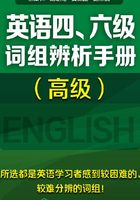
10 all in; tire out; use up; wear out
● all in是形容词词组,多作表语,也作补语,指人“精疲力竭”,多用于口语中。如:When she finally got back from the long walk she was all in.(她最后长途步行回来时,已精疲力竭。)After the marathon, most of the competitors looked all in.(跑完马拉松,大多数参赛者显得疲惫不堪。)They’re all in after this swim.(这趟游泳之后,他们累极了。)She felt all in after shopping for three hours.(买东西花了三个小时,她感到累得要命。)
● tire out是动副型词组,及物,主语可指人或物,宾语多指人。意为“精疲力竭”。如:Thus we created favourable conditions for tiring the enemy out.(我们就这样创造了使敌人疲惫的有利条件。)Going to school all day soon tires little children out.(整天上学念书很快会把小孩拖垮。)I’m tired out; I think I’ll go to bed.(我已精疲力竭,想上床休息了。)We were both tired out by the whole day’s shopping.(一天的购物使我们俩都累坏了。)
● use up也是动副型词组,及物,作“精疲力竭”之意时,常以ed分词形式作表语,多用于非正式场合。如:By the end of the war, he felt used up and sick of life.(战争结束时他已精疲力竭,对人生感到厌倦了。)The worker is totally used up from digging that hole.(挖那个坑累得那工人精疲力竭。)After rowing the boat across the lake, she was used up.(她划船过湖后,已筋疲力尽。)They feel used up and they must sit down and rest.(他们累极了,必须坐下休息一会儿。)
● wear out的意义与用法同tire out,只是tire out用于直陈,而wear out可用于比喻。如:I will not wear out my youth in idleness at home.(我不愿在家游手好闲地把我的青春消磨掉。)My patience wore out at last.(我最后失了耐心。)He was wore out from looking after his elderly mother.(照顾年迈的母亲,使他疲惫不堪。)You needed a holiday or you’ll wear yourself out.(你要休假了,不然,就会把自己弄得疲惫不堪。)